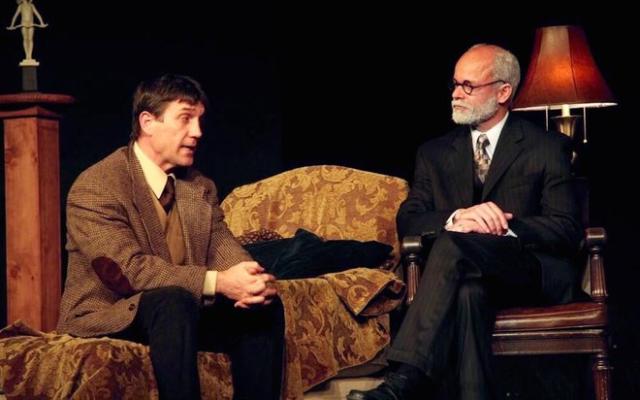
Locally well-known, Christian-based Acacia Theater has teamed up with Morning Star Productions to present Freud’s Last Session. The play is being presented at Morning Star’s regular performance space at Milwaukee’s Eastbrook Church. Acacia Theatre’s artistic director, Elaine Wyler, directs.
The play is set in Freud’s London study, where the father of psychoanalysis is awaiting the arrival of a guest, noted professor and author CS Lewis. The ever-inquisitive Freud is eager to discover why this formerly devout atheist has converted to a belief in God. The play is cleverly set in 1939, when Hitler’s troops are advancing throughout Europe. Freud, 83, is in exile from Vienna. Not only is he far from home, he is also suffering from the throat cancer that will eventually claim his life. He sits by his radio and listens to periodic news broadcasts about Hitler’s advancing troops. CS Lewis arrives and apologizes for his lateness. He explains that commuter trains are being diverted to assist those confined by hospitals and even prisons. During their opening conversation, he admits to being shaken by the news that nearly 40,000 soldiers died during the previous day’s fighting. It is a time when one could certainly doubt the existence of God in the face of such evil. Mark St. Germain’s play, written in 2010, opened Off-Broadway in 2011 at the Marjorie S. Deane Little Theater. It won critical praise in New York, and has been performed near Los Angeles, in Chicago as well as in other locations. One New York reviewer wrote at the time that Freud and Lewis’s meeting is a “clash of wits and egos.” Although the two men strain to remain pleasant, sparks begin to fly between them almost instantly. They attempt to find common ground. Both agree on the concept of Satan. It is only the existence of God that divides them. This play could easily have become a dry dissertation of “facts” that support each one’s position. But St. Germain gives us a fuller picture of the lives of both men, showing their own similarities as well as their differences. For instance, both discuss how they hated their fathers from childhood (this is Freud speaking, after all). Another revelation is the news that Freud, as a child, was routinely dragged to Catholic Church by his nanny. This gave him personal insight into religious practices and traditions. As for Lewis, who would have guessed that he suffered from post-traumatic stress disorder (PTSD)? His malady resulted from his military service in World War I. Years later, he still suffers from what he viewed on the battlefield. Even now, in his early 40s, Lewis dives for cover when an air raid siren accidentally goes off. As if by habit, he reaches for a nearby gas mask. Freud does the same. Both of the actors are equally fine in their respective roles. As CS Lewis, Simon Jon Provan displays his character’s quick wit. “Oh, we learned all about your perversions,” he tells Freud when asked about his familiarity with Freud’s work. For a play about such a serious subject, St. Germain achieves a perfect balance between humor and somber reflection. With his Freud, David Sapiro creates a realistic portrait of one of the greatest minds of the 20th century. It’s amazing to watch Sapiro talk as if he really had a plate inside his palate. Freud had such a device to compensate for the loss of soft tissue inside his mouth. While speaking, Sapiro twists and turns his mouth as if to readjust the plate to a less painful position. The minimal but effective set carries many telltale sign of Freud’s interests. For instance, piles of books are randomly placed around pieces of fine furniture. Some of the piles are propped up by decorative ceramic urns. Lewis comments on the number of small religious objects on Freud’s desk. Freud calls them his “toys,” as if to minimize their importance. But he admits to being a collector of such “toys” as well as his collection of ceramics and stone carvings from ancient Greece and Egypt. Movement choreographer Michael Landers also deserves credit for his skill in staging the play with a very naturalistic approach. Without his assistance, the two characters could have just plopped down in chairs and stayed there. But Freud remains both curious and castigating to the end, it seems, whether on his feet or sitting down at his desk.
